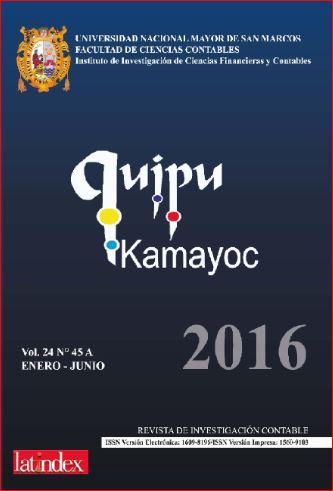CONSTRUCCIÓN DE LA TEORÍA CONTABLE A PARTIR DEL ANÁLISIS DE CASOS
DOI:
https://doi.org/10.15381/quipu.v24i45.12468Palabras clave:
Estudio de caso, metodología de investigación, teoría contable.Resumen
Para algunos autores, la contabilidad está considerada como una práctica social cuyo ámbito de acción es el contexto económico con impacto en las organizaciones. El estudio de casos es una metodología que puede unir la teoría con la práctica y generar fuente de conocimiento para construir teorías y doctrina contable. La contabilidad se aplica con mayor intensidad en la gestión: empresarial, gubernamental, ambiental, financiera; entre otras, estas han experimentado casuística importante que merecen ser difundidas entre los estudiantes y/o profesionales contables y de ciencias afines. El propósito es relacionar la investigación contable con la práctica profesional, la falta de vinculación de la teoría con el acontecer cotidiano de las organizaciones en general y la práctica contable en particular, hace que se teorice acerca de la contabilidad sin prestar atención a la investigación empírica, que a veces es muy criticada y cuestionada, pero que resulta importante como parte del proceso del conocimiento. En este escenario, surge la interrogante ¿Cómo exigir que evolucione la teoría contable, cuando no se recoge de la práctica hechos relevantes para ser investigados? El estudio es descriptivo y aporta a la ciencia contable resultados aplicativos, trasmisión de conocimientos y confirmación de teorías contables.
Descargas
Descargas
Publicado
Número
Sección
Licencia
Derechos de autor 2016 Elsa Esther Choy Zevallos

Esta obra está bajo una licencia internacional Creative Commons Atribución-NoComercial-CompartirIgual 4.0.
LOS AUTORES RETIENEN SUS DERECHOS:
a. Los autores retienen sus derechos de marca y patente, y también sobre cualquier proceso o procedimiento descrito en el artículo.
b. Los autores retienen el derecho de compartir, copiar, distribuir, ejecutar y comunicar públicamente el articulo publicado en la revista Quipukamayoc (por ejemplo, colocarlo en un repositorio institucional o publicarlo en un libro), con un reconocimiento de su publicación inicial en la revista Quipukamayoc.
c. Los autores retienen el derecho a hacer una posterior publicación de su trabajo, de utilizar el artículo o cualquier parte de aquel (por ejemplo: una compilación de sus trabajos, notas para conferencias, tesis, o para un libro), siempre que indiquen la fuente de publicación (autores del trabajo, revista, volumen, numero y fecha).






